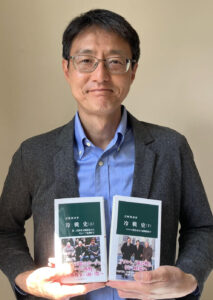Please click the link below to download the program in English.
お知らせ
- HOME
- News
The Fify-Ninth JAAS Annual Meeting Program
2025.05.26 What's New,Annual Meeting,Infomation
『アメリカ研究』第60号「特集論文」募集のお知らせ
2025.04.22 The American Review
『アメリカ研究』第60号の特集テーマは,「ローカル・アメリカ」です。趣意は以下の通りです。
ローカルという言葉は多義的である。一般的に流通している意味としては,特定の場所あるいは限られた範囲の地域という地理的概念であろう。アメリカ研究でローカルとは何かを考えれば,そうした一定のエリアに住む人びともまたローカルと称される。その人たちはそこに住む地元人というだけでなく,その地で育まれた生活世界に生きる人びとである。そして,その世界には独特な制度や習慣,精神文化が存在しており,それはまたこれらローカルな人びとが所有し,この人たちを特徴づけるものでもある。ローカルという言葉はその地に根差す独自の組織を指す場合もある。政治に目を向ければ,ローカルは正式な政治用語として使用されている。州によって違いはあるものの,それを構成する郡やさらに小さな単位としての自治体はローカルとして位置付けられる。地元の政治家や政治組織を形容する場合にもローカルが用いられる。また,労働組合の支部もローカルと呼ばれる。日本の全国紙のような存在がない新聞をはじめとしたメディアではローカルな媒体が果たす役割とその影響力は非常に大きい。
こうしたことから,ローカルは単に地理的範囲を限定する概念としてではなく,その地に独特な根拠―それは政治経済的な権益や人的関係だけでなく風土や精神文化も含む―を有しているものを包含していることが分かる。多義的な意味を持つローカルを視点に据えてアメリカを眺め直すと,どのようなアメリカが浮かび上がってくるだろうか。大統領が選ばれるまでの過程においてローカル・ポリティクスの持つ重要性は言うまでもない。全国遊説のキャンペーンではその地に応じたアピールやロジックが用いられ,演出が施される。それは取りも直さず,アメリカの津々浦々にローカルな地に生き,その地で人生を全うする人びとが少なからず存在していることを意味している。経済的な面でもローカルな地の生活を支えるための方策や産業の存在が持つ意味は非常に大きいだろう。ローカルとしての労働組合はまさにその関係の中において存在意義を持っている。ローカル・メディアはそのような中に生きる人びとの動向を伝え,その地の人びとはそれらが発信する情報を共有するのである。歴史研究ではローカルな地に生きる人びとやそこで築かれる人種やジェンダーなどの関係への関心が向けられてきた。文学でもローカルな地に存在する独特の世界と精神文化,そこに生きる人びとの在り方がさかんに描かれてきた。
次号の特集では「ローカル・アメリカ」をテーマとして,そこから抽出されるさまざまなアメリカの側面を検証する。多方面からの投稿を期待したい。
「特集論文」に応募希望の会員は,2025年6月末日までに,氏名・所属・論文題目および構想・資料などの説明(400字程度)を学会ホームページの「お問い合わせ・応募」フォームより年報編集委員会宛にお申し込み下さい。その際,上記フォームの「お問い合わせ内容」欄に「『アメリカ研究』特集応募」と明記してください。
執筆要項は学会ウェブサイトを参照のこと。
原稿締め切りは2025年8月31日(日)とします。
年報編集委員会
『アメリカ研究』第60号「自由投稿論文」募集のお知らせ
2025.04.22 The American Review
学会機関誌『アメリカ研究』(年報)は2026年3月に第60号を刊行する予定です。会員諸氏の積極的な投稿をお待ちしております。
1. 内 容
アメリカ研究に関する未発表論文。前年度『アメリカ研究』もしくは『英文ジャーナル』に論文が掲載された方は,本年度の投稿をご遠慮ください。また,同じ年度に,あるいは年度をまたいで『アメリカ研究』と『英文ジャーナル』の双方に投稿することはできません。これはなるべく多くの会員に発表の機会を提供するためです。
2. 枚 数
論文は33字×34行のレイアウトで19ページ以内(註を含む)。
執筆要項は学会ホームページを参照のこと。
3. 原稿締め切り 2025年8月31日(日)
4. 提 出
投稿希望者は2025年6月末日までに,学会ホームページの「お問い合わせ・応募」フォームより年報編集委員会宛に「論文題目」をお送りください。論文原稿は電子ファイルによる提出となります。
年報編集委員会
No.35 (2024) Voices
2024.12.07 The Japanese Journal of American Studies
5. Yukako HISADA, Recovering Voices from Lowell, Massachusetts in the 1830s: Women Workers’ Strikes, Antislavery Petitions, and Anti-Abolition Mobs
23. Junko MIURA, Mexican Laborers, American Workers, and New Deal Socioeconomic Politics: The San Antonio Pecan Shellers Strike of 1938
47. Takeya MIZUNO, Real Voices or Government Mouthpieces? U.S. Propaganda Efforts to Use Japanese Americans in World War II Camps
71. Ryoichi YAMANE, Voices That Matter: Walker Percy’s Semiotic Masculinity in The Moviegoer
95. Keiko WELLS, Voices of Two Little Girls Blue: Janis Joplin, Nina Simone, and the Blues
129. Yohei SEKIGUCHI, Whispering without Sound: Patriarchal Historiography of Women’s Reproduction and Herstories in The Cider House Rules and The Handmaid’s Tale
Call for Proposals: Independent Paper Sessions The 59th Annual Conference of the Japanese Association for American Studies
2024.09.19 What's New,Annual Meeting,Infomation
The 59th Annual Meeting of the JAAS will be held at Hokkaido University in Sapporo on
May 31 and June 1, 2025. The Program Coordinating Committee invites proposals for the
“Independent Paper Sessions” to be held during the morning of the first day, May 31.
Submission:
Submit your proposal (PDF) that includes: 1) your name and affiliation; 2) the title; 3) the abstract (approximately 800 words); 4) five keywords, via the following section of the American Studies Association website.
https://www.jaas.gr.jp/outline/contact-us.html?lang=en (page in English)
https://www.jaas.gr.jp/outline/contact-us.html#contact (page in Japanese)
Deadline: November 15, 2024.
Acceptance and decline emails will be sent in early January.
Proposal from Japan:
JAAS members are eligible for submission. Non-members wishing to submit proposals are asked to complete the membership application upon submission.
Proposal from outside Japan:
Submissions from both JAAS members and non-members are reviewed. Upon acceptance, non-members are asked to make the conference registration by e-mail no later than March 1, 2025. Also, the 8,000 JPY registration fee (non-refundable) should be paid at the venue prior to the presentation.
* Non-members living outside Japan may present papers once without becoming formal members of the JAAS. From the second time on, you are asked to become a member before presenting a paper. You can apply for the membership upon submission.
** You can present papers for two consecutive years, but not three years in a row.
***All the submissions should be previously unpublished and should not be under consideration for publication elsewhere. The committee accepts proposals in English and Japanese.
****When your proposal is accepted, you will be asked to submit the full paper (approximately 5,000 to 7,500 words in English, 8,000 to 12,000 letters in Japanese) to the Committee no later than May 10, 2025. The paper, locked with the password, will be posted on the JAAS website for the members prior to the Annual Meeting.
The JAAS Annual Meeting Program Coordinating Committee
第29回清水博賞のお知らせ
2024.06.03 What's New,Society Award,清水博賞,Infomation
2023年1月1日から12月31日の期間に出版された著作のな
第5回中原伸之賞のお知らせ
2024.06.03 What's New,Society Award,中原伸之賞,Infomation
2023年1月1日から12月31日の期間に出版された著作のな
青野利彦(一橋大学)
『冷戦史(上)第二次世界大戦終結からキューバ危機まで』、
『冷戦史(下)ベトナム戦争からソ連崩壊まで』(中公新書)
The Fifty-Eighth JAAS Annual Meeting Program
2024.04.17 What's New,Annual Meeting,Infomation
The 58th JAAS Annual Meeting will be held on June 1st and 2nd, 2024 at Waseda University, Tokyo.
The Fifty-Eighth JAAS Annual Meeting Program
No.34(2023)Division, Diversity, and Unity
2023.12.13 The Japanese Journal of American Studies
3. Seong-Ho LIM, What Kind of “America” Mattered in the State Building of South Korea? The “Tudor” Polity and the “Progressive” State
29. Yoshiko UZAWA, The Yellow Jacket (1912): Chinese Opera as Techne in Early Twentieth-Century American Theatre
45. Hiro MATSUBARA, “What a Quickening It Was to My Soul”: The Emergence of Women’s Autonomy in the New York Religious Tract Society, 1812–1826
67. Junko ISONO KATO, Counting Diversity in an Attempt to Achieve Unity: How the Three-Fifths Clause United and Divided Americans
89. Yuki ODA, Family Unity and “Noncitizen Citizenship”: The Advocacy of the International Institutes on Behalf of Separated Families
111. Shunta MATSUMOTO, The Role of Congress in the Current Polarized Age: Unified Decision-Maker or Partisan Arena?
137. Yutaka NAKAMURA, Informal Mediation on the Street: An Ethnographic Exploration of Discrimination and Division within Muslim Communities in Harlem
The Fifty-Seventh JAAS Annual Meeting Map&Guide
2023.05.28 What's New,Annual Meeting,Infomation
Map to the Ikuta Campus is below.
Recent Posts
- 『アメリカ研究』第60号「特集論文」募集のお知らせ
- 『アメリカ研究』第60号「自由投稿論文」募集のお知らせ
- STYLE SHEET AND GUIDE FOR AUTHORS
- 47. Anglo-America (2013)
- 46. The Sea and the State (2012)
Categories
Archives
- May 2025
- April 2025
- December 2024
- September 2024
- June 2024
- April 2024
- December 2023
- May 2023
- April 2022
- June 2021
- April 2021
- March 2021
- April 2020
- April 2019
- April 2018
- April 2017
- April 2016
- April 2015
- April 2014
- April 2013
- March 2013
- April 2012
- March 2012
- April 2011
- March 2011
- April 2010
- March 2010
- April 2009
- March 2009
- April 2008
- March 2008
- April 2007
- March 2007
- April 2006
- March 2006
- April 2005
- March 2005
- April 2004
- March 2004
- April 2003
- March 2003
- April 2002
- March 2002
- April 2001
- March 2001
- April 2000
- March 2000
- April 1999
- March 1999
- April 1998
- March 1998
- April 1997
- March 1997
- April 1996
- March 1996
- April 1995
- March 1995
- April 1994
- March 1994
- March 1993
- March 1992
- April 1991
- March 1991
- March 1990
- April 1989
- March 1989
- March 1988
- April 1985
- April 1981
